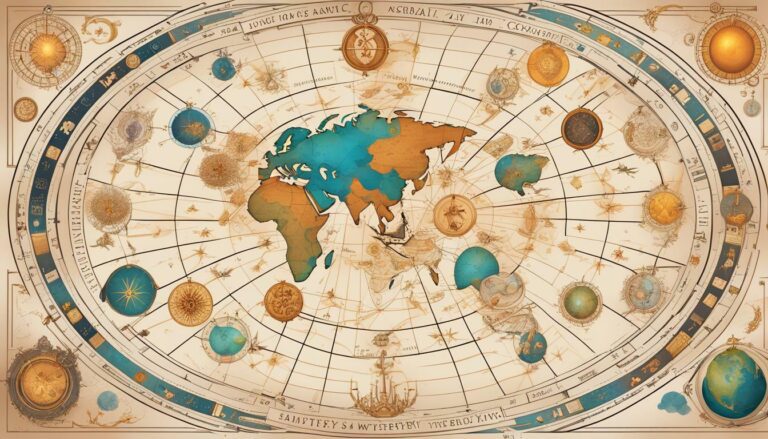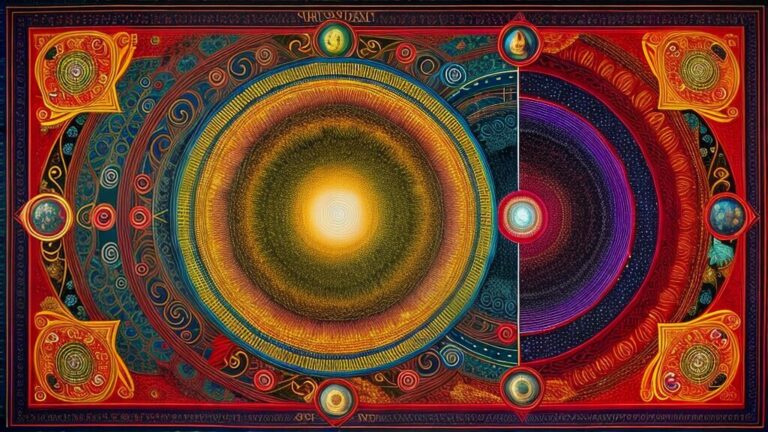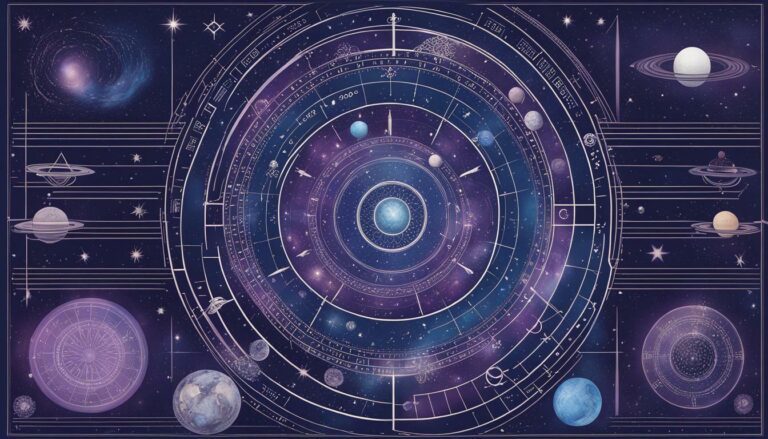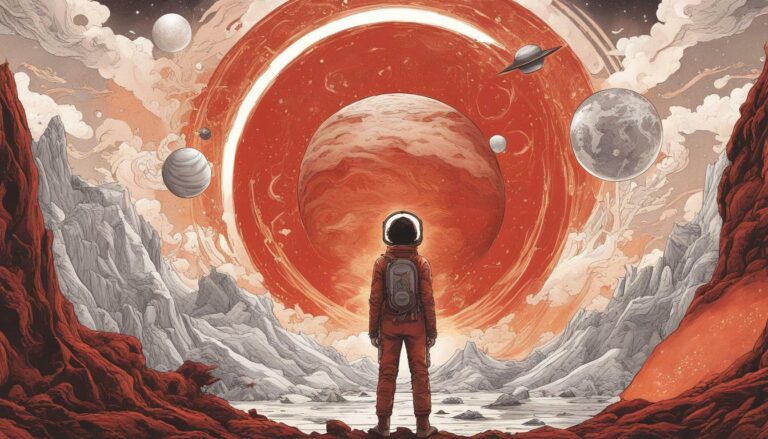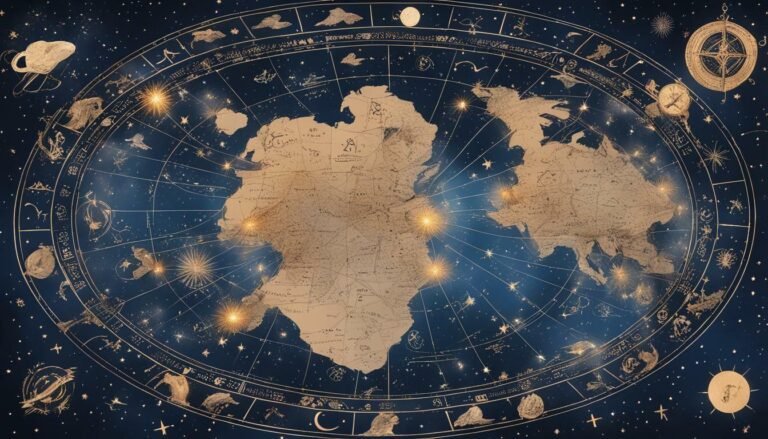What Sign is the Moon in Today? Vedic Astrology Insights
Have you ever felt like your emotions are all over the place, and you can’t quite figure out why? According to Vedic astrology, the answer might lie in the moon’s current position.
The moon sign is a crucial element in understanding our emotional and instinctual nature. It represents our subconscious mind, our inner world, and our automatic responses to different situations.
By understanding the influence of the moon sign, you can gain valuable insights into your own personality, relationships, and overall well-being.
Key Takeaways:
- The moon sign is a crucial element in Vedic astrology.
- It represents our emotional and instinctual nature.
- Understanding the moon sign can provide valuable insights into personality and relationships.
Understanding Vedic Astrology and Moon Signs
If you’re new to Vedic astrology, you may be wondering what it’s all about. Vedic astrology is an ancient system of divination that originated in India. It’s based on the position of the planets and stars at the time of your birth and their influence on your life.
One of the key components of Vedic astrology is the moon sign. In this system, the moon sign is considered to be just as important as the sun sign in Western astrology. Your moon sign is determined by the position of the moon at the time of your birth.
In Vedic astrology, the moon represents your emotions and instincts. It’s said to have a powerful influence on your subconscious mind, shaping your behavior and desires. By understanding your moon sign, you can gain valuable insights into your personality and emotional nature.
How Moon Signs Are Calculated
Calculating your moon sign in Vedic astrology requires some basic knowledge of astronomy and mathematics. It’s based on the position of the moon in relation to the constellations or nakshatras at the time of your birth.
While it’s possible to calculate your moon sign manually, many people prefer to use online tools that make the process easier and more accurate. There are numerous websites and apps that can calculate your moon sign based on your birth date, time, and location.
The Significance of Moon Signs
In Vedic astrology, each moon sign is associated with particular qualities and tendencies. Your moon sign can reveal your emotional strengths and weaknesses, your natural instincts, and even your relationship patterns.
For example, if your moon is in Aries, you may be prone to impulsiveness and a quick temper. If your moon is in Taurus, you may have strong materialistic tendencies and a deep appreciation for beauty and comfort.
Understanding your moon sign can help you learn to navigate your emotions more effectively and make better decisions in your personal and professional life.
The Moon’s Transit and Its Significance
In Vedic astrology, the position of the moon in a particular zodiac sign at a given time is important in assessing an individual’s emotional state. However, the moon’s transit through the zodiac signs also holds a great deal of significance. The moon moves relatively quickly through the zodiac, taking approximately 2.5 days to transition from one sign to another.
As the moon transits through each sign, it influences our emotions, energy levels, and overall well-being. The energy of the sign the moon is in can affect our mood, and may bring out certain qualities in our personality.
For example, when the moon is in the sign of Aries, people may feel more impulsive and spontaneous, while during the moon’s transit through Pisces, emotions may be intensified, and individuals may feel more imaginative and intuitive.
The moon’s transit also has an impact on our relationships and interactions with others. During certain transits, it may be more challenging to communicate effectively, while in other transits, we may feel more in sync with those around us.
The Phases of the Moon
Another important factor to consider during the moon’s transit is the phase of the moon. The moon goes through several phases each month, and each phase has a unique energy and significance.
During the new moon phase, emotions may be more subdued, and it is an excellent time for new beginnings or setting intentions. The full moon phase is when emotions are heightened, and it is a time of culmination and manifestation. The waxing and waning phases of the moon are also significant and can influence our decision-making and emotional state.
To harness the energy of the moon’s transit and phases, it is essential to be aware of the current moon sign and phase. By understanding the moon’s movement through the zodiac and the additional factors that impact its energy, you can gain insight into your emotional state and make decisions that align with the energy of the current transit.
Determining Today’s Moon Sign
To find out the current moon sign in Vedic astrology, you need to know the time and location of your birth or the birth of the person you’re interested in. The moon moves approximately one degree every two hours, so it’s crucial to be as accurate as possible with the birth time.
| Step | Calculation |
|---|---|
| 1 | Convert the birth time to Coordinated Universal Time (UTC) if necessary. |
| 2 | Calculate the Julian Day Number (JD) of the birth date and time. |
| 3 | Use the JD to determine the position of the moon in the zodiac using an ephemeris or online calculator. |
Once you have the moon’s position, you can easily identify its sign. The moon stays in a sign for approximately 2.5 days, so it’s important to check the moon sign daily.
If you don’t have access to a reliable ephemeris or calculator, there are several free online resources that can help you determine the moon sign of the day. Simply input the date, time, and location of birth, and the website will provide you with the necessary information.
Interpreting the Moon Sign of the Day
Now that you know how to determine today’s moon sign, it’s time to interpret what it means for you. Keep in mind that the moon sign influences your emotions and instincts, but it doesn’t define your entire personality or destiny.
If the moon is in Aries today, you may feel more impulsive and competitive than usual. It’s a good time to channel your energy into physical activities and take bold risks. However, be mindful of being too aggressive or impatient with others.
If the moon is in Taurus, you may crave comfort, stability, and sensual pleasures. It’s a time to indulge in self-care and appreciate the beauty around you. However, be cautious of being too possessive or resistant to change.
If the moon is in Gemini, you may feel more communicative, curious, and adaptable than usual. It’s a good time to engage in social activities, learn new things, and express yourself creatively. However, be aware of being too scattered or superficial in your interactions.
If the moon is in Cancer, you may feel more nurturing, sensitive, and intuitive than usual. It’s a time to connect with your emotions, family, and home environment. However, be careful of being too clingy or moody with others.
If the moon is in Leo, you may feel more confident, passionate, and expressive than usual. It’s a time to showcase your talents, lead with charisma, and have fun. However, be mindful of being too self-centered or attention-seeking.
If the moon is in Virgo, you may feel more analytical, practical, and detail-oriented than usual. It’s a time to organize your life, improve your health, and be of service to others. However, be cautious of being too critical or anxious about imperfections.
If the moon is in Libra, you may feel more diplomatic, balanced, and romantic than usual. It’s a time to cultivate harmonious relationships, appreciate art and beauty, and seek fairness. However, be aware of being too indecisive or people-pleasing.
If the moon is in Scorpio, you may feel more intense, passionate, and transformative than usual. It’s a time to delve into your deeper emotions, investigate mysteries, and embrace change. However, be careful of being too secretive or controlling in your relationships.
If the moon is in Sagittarius, you may feel more adventurous, optimistic, and philosophical than usual. It’s a time to explore new horizons, expand your knowledge, and seek meaning. However, be mindful of being too reckless or dogmatic in your beliefs.
If the moon is in Capricorn, you may feel more disciplined, responsible, and ambitious than usual. It’s a time to pursue your goals, build your reputation, and take leadership. However, be cautious of being too rigid or workaholic, neglecting your emotional needs.
If the moon is in Aquarius, you may feel more innovative, independent, and humanitarian than usual. It’s a time to challenge conventions, connect with diverse perspectives, and contribute to social causes. However, be aware of being too rebellious or detached from intimacy.
If the moon is in Pisces, you may feel more intuitive, empathetic, and dreamy than usual. It’s a time to tap into your creativity, spirituality, and inner wisdom. However, be careful of being too escapist or gullible, losing touch with reality.
Effects of the Moon’s Energy on Daily Life
Knowing the moon sign of the day can provide you with valuable insights into your emotional state and help you understand the best ways to take care of yourself. By aligning your self-care practices with the energy of the moon, you can enhance your emotional well-being and overall quality of life.
For example, if the moon is in Aries, a fire sign associated with energy and passion, you may feel more energetic and motivated than usual. This can be a great time to engage in physical activities, try something new, or tackle a challenging project.
On the other hand, if the moon is in Cancer, a water sign associated with emotions and sensitivity, you may feel more emotional and introspective than usual. This can be a good time to focus on self-care practices that promote emotional healing, such as journaling, meditation, or spending time in nature.
It’s important to note that the moon’s energy can affect everyone differently based on their individual moon sign and other planetary influences. By understanding how the moon’s energy is specifically affecting you, you can tailor your self-care practices to your unique needs and enhance your emotional well-being.
Enhancing Your Life with Vedic Astrology Wisdom
Now that you have a better understanding of the moon sign and its significance in Vedic astrology, you can leverage this wisdom to enhance your life. Here are some practical ways to incorporate moon sign insights into your daily routine:
- Self-awareness: Understanding your own moon sign can help you recognize and manage your emotions better. Pay attention to how the moon’s transit through your sign affects your mood and energy levels.
- Relationships: Learning about the moon sign of your loved ones can help you communicate better and deepen your understanding of each other’s emotional needs. Use moon sign insights to strengthen your personal and professional relationships.
- Decision-making: Consider the current moon sign when making important decisions. Some moon signs are more conducive to certain activities or types of communication than others. Use this knowledge to maximize your productivity and success.
- Self-care: Align your self-care practices with the energy of the current moon sign. For example, if the moon is in a water sign, taking a relaxing bath or engaging in creative activities can be particularly soothing.
By incorporating these practices into your life, you can tap into the wisdom of Vedic astrology and nurture your emotional well-being. Remember that the moon sign is just one aspect of your astrological makeup, but it can provide valuable insights into your instincts and emotions.
Understanding Moon Transits and Timing
Timing is everything when it comes to understanding the moon’s energy and its impact on your life. The moon moves through the zodiac signs at a different pace, spending roughly 2-3 days in each sign. This means that the moon transits through all 12 zodiac signs in a 29.5-day cycle.
Each phase of the moon also has its own unique energy that can affect our emotions and energy levels differently. For example, the new moon is associated with beginnings and planting seeds, while the full moon is associated with culmination and release.
To fully leverage the power of moon transits, it’s important to keep track of the moon’s movement and timing. You can use online resources or apps to stay informed about the current moon sign and phase, and plan your activities and decisions accordingly.
The Impact of Moon Transits on Emotions and Decisions
When the moon transits through a zodiac sign, it can influence the emotional and instinctual responses of individuals with that moon sign. For example, if the moon is currently in Cancer, individuals with a Cancer moon sign may feel more sensitive, nurturing, and intuitive.
It’s important to be aware of the potential effects of moon transits on decision-making as well. During certain phases of the moon, you may feel more inclined to take risks or be more cautious, depending on the energy of the sign.
By understanding the impact of moon transits on emotions and decisions, you can learn to work with the natural flow of energy and use it to your advantage. Whether you’re starting a new project, making a big decision, or navigating a challenging relationship, the moon’s current energy can provide valuable insights and guidance.
Planetary Influences on Moon Signs
While the moon sign is an important factor in Vedic astrology, it is not the only one. Other celestial bodies, such as the planets, can also have an impact on an individual’s emotional nature and instincts.
For example, if your moon sign is Aries and Mars is in a strong position in your birth chart, you may exhibit more assertiveness and impulsivity than a typical Aries moon sign. Similarly, if you have a Taurus moon sign and Venus is located in a weak position in your chart, you may struggle with self-doubt and indecisiveness.
It’s important to consider all the planetary influences when interpreting the moon sign and gaining a deeper understanding of oneself. A trained Vedic astrologer can provide more insights into how these influences interact and affect your life.
Significance of the Moon Sign for Relationships
Have you ever wondered why you connect so well with some people, but struggle to understand others? One key factor may be the moon sign. Understanding your own and others’ moon signs can provide valuable insights into communication, empathy, and compatibility in personal and professional relationships.
The moon sign influences our emotional nature and instincts. It reveals how we express and process emotions, and what we need to feel emotionally secure. When two individuals have compatible moon signs, they share a similar emotional language and are able to communicate effectively, understand each other’s needs, and build trust and intimacy.
On the other hand, incompatible moon signs may lead to misunderstandings, conflict, and emotional distance. For example, a fire sign moon (Aries, Leo, Sagittarius) may clash with a water sign moon (Cancer, Scorpio, Pisces), as fire tends to be more impulsive and direct while water is more sensitive and intuitive.
By understanding the moon sign of yourself and others, you can bridge communication gaps, anticipate emotional reactions, and approach conflicts with empathy and understanding. It can also help you choose compatible partners, whether it’s in romantic relationships or business partnerships.
So, the next time you meet someone new, consider looking up their moon sign to gain insights into their emotional nature and how to best interact with them. Your relationships may just benefit from this astrological wisdom.
Nurturing Your Emotional Well-being with Moon Sign Insights
Understanding your moon sign can be a powerful tool in maintaining emotional balance and well-being. Here are some tips and suggestions to help you nurture your emotional health with moon sign insights.
- Keep a moon journal. Record your mood and energy levels each day and note the moon sign for that day. Over time, you may notice patterns in how the moon affects your emotions and behaviors.
- Engage in activities aligned with the moon’s energy. For example, during the waxing moon, focus on setting intentions and starting new projects. During the full moon, release what no longer serves you and practice gratitude. During the waning moon, let go of negative habits or emotions.
- Pay attention to your instincts. Your moon sign can provide insights into your gut instincts and intuition. Trust and follow these instincts, as they can guide you towards the right decisions and actions.
- Communicate with empathy and understanding. Understanding the moon sign of others can help you communicate more effectively and build stronger relationships. Pay attention to how their emotions and behaviors may vary depending on the moon sign of the day.
- Practice self-care. Use moon sign insights to tailor self-care practices that align with the energy of the day. For example, during a fire sign moon, engage in energizing activities like exercise or dancing. During a water sign moon, take a relaxing bath or practice meditation.
Remember, the moon’s energy is constantly shifting, and so are our emotions and instincts. By staying attuned to the moon sign of the day and practicing self-awareness, you can nurture your emotional well-being and lead a more fulfilling life.
Conclusion
Understanding the moon sign in Vedic astrology can provide valuable insights into your emotional nature, instincts, and relationships. By paying attention to the moon’s transit and the energy it brings, you can make better decisions and engage in self-care practices that promote emotional well-being.
Today, you have learned how to determine the moon sign for the day and interpret its influence on your life. You have also explored the significance of moon signs in relationships and how to leverage this knowledge for better communication and empathy.
As you continue to explore Vedic astrology wisdom, remember to approach it with an open mind and a willingness to learn. Incorporating this knowledge into your life can lead to greater self-awareness, personal growth, and overall well-being.
Take Action:
Try incorporating some of the self-care practices suggested for your moon sign of the day. Notice how they make you feel and adjust as necessary. Consider also exploring the moon signs of your loved ones and colleagues, and how this knowledge can enhance your relationships.
FAQ
Q: What is Vedic astrology?
A: Vedic astrology is an ancient Indian system of astrology that has its roots in the Vedas, the sacred texts of Hinduism. It is known for its accuracy and detailed analysis of an individual’s life based on their birth chart.
Q: What is a moon sign?
A: A moon sign, also known as Rashi in Vedic astrology, represents the zodiac sign in which the moon was located at the time of an individual’s birth. It provides insights into a person’s emotional nature and instincts.
Q: How can I determine today’s moon sign?
A: To determine today’s moon sign, you can consult Vedic astrology websites, mobile applications, or ephemeris. These sources provide accurate information about the current position of the moon in the zodiac.
Q: How does the moon’s transit affect us?
A: The moon’s transit through different zodiac signs has a significant influence on our emotions, energy levels, and overall well-being. It can affect our moods, decision-making, and interactions with others.
Q: How can knowing my moon sign benefit me?
A: Knowing your moon sign can help you understand your emotions better, make informed decisions, and navigate your relationships more effectively. It provides insights into your innate instincts and can guide you towards personal growth and self-care.
Q: Can moon signs affect relationships?
A: Yes, moon signs play a significant role in relationships. Understanding your moon sign and that of your partner can enhance communication, empathy, and compatibility. It helps in building stronger connections and resolving conflicts.
Q: How can I use moon sign insights for self-care?
A: You can use moon sign insights for self-care by aligning your activities and practices with the energy of the current moon sign. This can involve engaging in activities that support emotional well-being, such as journaling, meditation, or spending time in nature.

